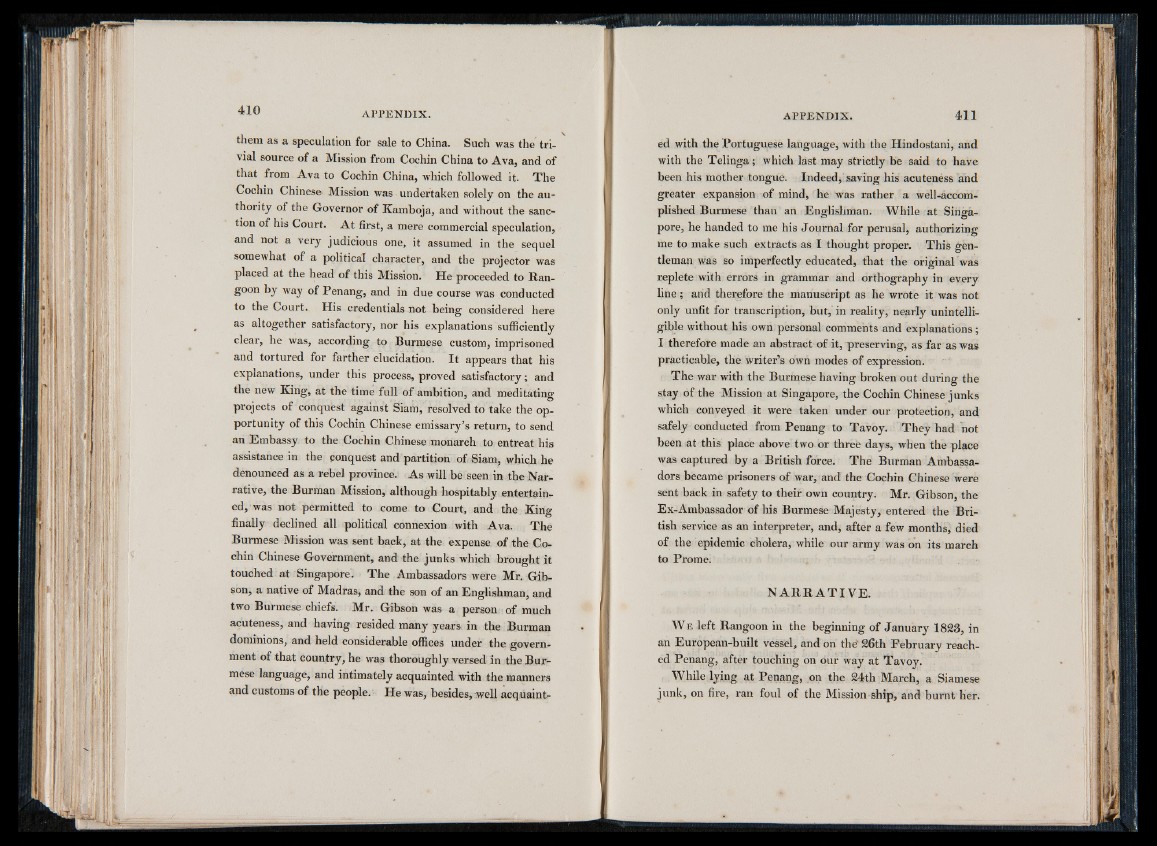
them as a speculation for sale to China. Such was the trivial
source of a Mission from Cochin China to Ava, and of
that from Ava to Cochin China, which followed it. Th e
Cochin Chinese Mission was undertaken solely on the authority
of the Governor o f Kamboja, and without the sanction
of his Court. A t first, a mere commercial speculation,
and not a very judicious one, it assumed in the sequel
somewhat of a political character, and the projector was
placed at the head o f this Mission. He proceeded to Rangoon
by way of Penang, and in due course was conducted
to the Court. H is credentials not being considered here
as altogether satisfactory, nor his explanations sufficiently
clear, he was, according to Burmese custom, imprisoned
and tortured for farther elucidation. It appears that his
explanations, under this process, proved satisfactory; and
the new King, at the time full o f ambition, and meditating
projects o f conquest against Siam, resolved to take the opportunity
of this Cochin Chinese emissary’s return, to send
an Embassy to the Cochin Chinese monarch to entreat his
assistance in the conquest and partition of Siam, which he
denounced as a rebel province. A s will be seen in the Narrative,
the Burman Mission, although hospitably entertained,
was not permitted to come to Court, and the Kins
finally declined all political connexion with Ava. The
Burmese Mission was sent back, at the expense o f the Cochin
Chinese Government, and the junks which brought it
touched at Singapore. Th e Ambassadors were Mr. Gibson,
a native of Madras, and the son of an Englishman, and
two Burmese chiefs. Mr. Gibson was a person o f much
acuteness, and having resided many years, in the Burman
dominions, and held considerable offices under the government
of that country, he was thoroughly versed in the Burmese
language, and intimately acquainted with the manners
and customs of the people. - H e was, besides, iwell acquainted
with the Portuguese language, with the Hindostani, and
with the T e lin g a ; which last may strictly be said to have
been his mother tongue. Indeed, saving his acuteness and
greater expansion o f mind, he was rather a well-accomplished
Burmese than an Englishman. While at Singapore,
he handed to me his Journal for perusal, authorizing
me to make such extracts as I thought proper. This gentleman
was so imperfectly educated, that the original was
replete with errors in grammar and orthography in every
line ; and therefore the manuscript as he wrote it was not
only unfit for transcription, but, in reality, nearly unintelligible
without his own personal comments and explanations;
I therefore made an abstract o f it, preserving, as far as was
practicable, the writer’s own modes o f expression.
The war with the Burmese having broken out during the
stay of the Mission at Singapore, the Cochin Chinese junks
which conveyed it were taken under our protection, and
safely conducted from Penang to Tavoy. They had not
been at this place above two or three days, when the place
was captured by a British force. The Burman Ambassadors
became prisoners o f war, and the Cochin Chinese were
sent back in safety to their own country. Mr. Gibson, the
Ex-Ambassador o f his Burmese Majesty, entered the British
service as an interpreter, and, after a few months, died
o f the epidemic cholera, while our army was on its march
to Prome.
N A R R A T I V E .
W e left Rangoon in the beginning o f January 1823, in
an European-built vessel, and on the* 26th February reached
Penang, after touching on our way at Tavoy.
While lying at Penang, on the 24th March, a Siamese
junk, on fire, ran foul of the Mission ship, and burnt her.